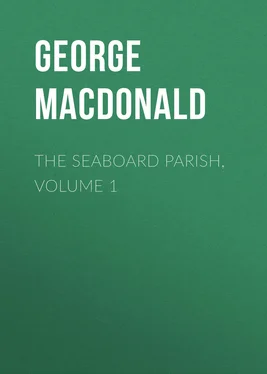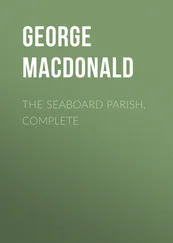George MacDonald - The Seaboard Parish, Volume 1
Здесь есть возможность читать онлайн «George MacDonald - The Seaboard Parish, Volume 1» — ознакомительный отрывок электронной книги совершенно бесплатно, а после прочтения отрывка купить полную версию. В некоторых случаях можно слушать аудио, скачать через торрент в формате fb2 и присутствует краткое содержание. Жанр: foreign_prose, foreign_religion, foreign_antique, на английском языке. Описание произведения, (предисловие) а так же отзывы посетителей доступны на портале библиотеки ЛибКат.
- Название:The Seaboard Parish, Volume 1
- Автор:
- Жанр:
- Год:неизвестен
- ISBN:нет данных
- Рейтинг книги:3 / 5. Голосов: 1
-
Избранное:Добавить в избранное
- Отзывы:
-
Ваша оценка:
- 60
- 1
- 2
- 3
- 4
- 5
The Seaboard Parish, Volume 1: краткое содержание, описание и аннотация
Предлагаем к чтению аннотацию, описание, краткое содержание или предисловие (зависит от того, что написал сам автор книги «The Seaboard Parish, Volume 1»). Если вы не нашли необходимую информацию о книге — напишите в комментариях, мы постараемся отыскать её.
The Seaboard Parish, Volume 1 — читать онлайн ознакомительный отрывок
Ниже представлен текст книги, разбитый по страницам. Система сохранения места последней прочитанной страницы, позволяет с удобством читать онлайн бесплатно книгу «The Seaboard Parish, Volume 1», без необходимости каждый раз заново искать на чём Вы остановились. Поставьте закладку, и сможете в любой момент перейти на страницу, на которой закончили чтение.
Интервал:
Закладка:
"Dear papa, some of your explanations are more difficult than the things themselves. May I be as impertinent as I like on my birthday?" she asked suddenly, again looking up in my face.
We were walking now, and she had a hold of my horse's mane, so as to keep her pony close up.
"Yes, my dear, as impertinent as you like—not an atom more, mind."
"Well, papa, I sometimes wish you wouldn't explain things so much. I seem to understand you all the time you are preaching, but when I try the text afterwards by myself, I can't make anything of it, and I've forgotten every word you said about it."
"Perhaps that is because you have no right to understand it."
"I thought all Protestants had a right to understand every word of the Bible," she returned.
"If they can," I rejoined. "But last Sunday, for instance, I did not expect anybody there to understand a certain bit of my sermon, except your mamma and Thomas Weir."
"How funny! What part of it was that?"
"O! I'm not going to tell you. You have no right to understand it. But most likely you thought you understood it perfectly, and it appeared to you, in consequence, very commonplace."
"In consequence of what?"
"In consequence of your thinking you understood it."
"O, papa dear! you're getting worse and worse. It's not often I ask you anything—and on my birthday too! It is really too bad of you to bewilder my poor little brains in this way."
"I will try to make you see what I mean, my pet. No talk about an idea that you never had in your head at all, can make you have that idea. If you had never seen a horse, no description even, not to say no amount of remark, would bring the figure of a horse before your mind. Much more is this the case with truths that belong to the convictions and feelings of the heart. Suppose a man had never in his life asked God for anything, or thanked God for anything, would his opinion as to what David meant in one of his worshipping psalms be worth much? The whole thing would be beyond him. If you have never known what it is to have care of any kind upon you, you cannot understand what our Lord means when he tells us to take no thought for the morrow."
"But indeed, papa, I am very full of care sometimes, though not perhaps about to-morrow precisely. But that does not matter, does it?"
"Certainly not. Tell me what you are full of care about, my child, and perhaps I can help you."
"You often say, papa, that half the misery in this world comes from idleness, and that you do not believe that in a world where God is at work every day, Sundays not excepted, it could have been intended that women any more than men should have nothing to do. Now what am I to do? What have I been sent into the world for? I don't see it; and I feel very useless and wrong sometimes."
"I do not think there is very much to complain of you in that respect, Connie. You, and your sister as well, help me very much in my parish. You take much off your mother's hands too. And you do a good deal for the poor. You teach your younger brothers and sister, and meantime you are learning yourselves."
"Yes, but that's not work."
"It is work. And it is the work that is given you to do at present. And you would do it much better if you were to look at it in that light. Not that I have anything to complain of."
"But I don't want to stop at home and lead an easy, comfortable life, when there are so many to help everywhere in the world."
"Is there anything better in doing something where God has not placed you, than in doing it where he has placed you?"
"No, papa. But my sisters are quite enough for all you have for us to do at home. Is nobody ever to go away to find the work meant for her? You won't think, dear papa, that I want to get away from home, will you?"
"No, my dear. I believe that you are really thinking about duty. And now comes the moment for considering the passage to which you began by referring:—What God may hereafter require of you, you must not give yourself the least trouble about. Everything he gives you to do, you must do as well as ever you can, and that is the best possible preparation for what he may want you to do next. If people would but do what they have to do, they would always find themselves ready for what came next. And I do not believe that those who follow this rule are ever left floundering on the sea-deserted sands of inaction, unable to find water enough to swim in."
"Thank you, dear papa. That's a little sermon all to myself, and I think I shall understand it even when I think about it afterwards. Now let's have a trot."
"There is one thing more I ought to speak about though, Connie. It is not your moral nature alone you ought to cultivate. You ought to make yourself as worth God's making as you possibly can. Now I am a little doubtful whether you keep up your studies at all."
She shrugged her pretty shoulders playfully, looking up in my face again.
"I don't like dry things, papa."
"Nobody does."
"Nobody!" she exclaimed. "How do the grammars and history-books come to be written then?"
In talking to me, somehow, the child always put on a more childish tone than when she talked to anyone else. I am certain there was no affection in it, though. Indeed, how could she be affected with her fault-finding old father?
"No. Those books are exceedingly interesting to the people that make them. Dry things are just things that you do not know enough about to care for them. And all you learn at school is next to nothing to what you have to learn."
"What must I do then?" she asked with a sigh. "Must I go all over my French Grammar again? O dear! I do hate it so!"
"If you will tell me something you like, Connie, instead of something you don't like, I may be able to give you advice. Is there nothing you are fond of?" I continued, finding that she remained silent.
"I don't know anything in particular—that is, I don't know anything in the way of school-work that I really liked. I don't mean that I didn't try to do what I had to do, for I did. There was just one thing I liked—the poetry we had to learn once a week. But I suppose gentlemen count that silly—don't they?"
"On the contrary, my dear, I would make that liking of yours the foundation of all your work. Besides, I think poetry the grandest thing God has given us—though perhaps you and I might not quite agree about what poetry was poetry enough to be counted an especial gift of God. Now, what poetry do you like best?"
"Mrs. Hemans's, I think, papa."
"Well, very well, to begin with. 'There is,' as Mr. Carlyle said to a friend of mine—'There is a thin vein of true poetry in Mrs. Hemans.' But it is time you had done with thin things, however good they may be. Most people never get beyond spoon-meat—in this world, at least, and they expect nothing else in the world to come. I must take you in hand myself, and see what I can do for you. It is wretched to see capable enough creatures, all for want of a little guidance, bursting with admiration of what owes its principal charm to novelty of form, gained at the cost of expression and sense. Not that that applies to Mrs. Hemans. She is simple enough, only diluted to a degree. But I hold that whatever mental food you take should be just a little too strong for you. That implies trouble, necessitates growth, and involves delight."
"I sha'n't mind how difficult it is if you help me, papa. But it is anything but satisfactory to go groping on without knowing what you are about."
I ought to have mentioned that Constance had been at school for two years, and had only been home a month that very day, in order to account for my knowing so little about her tastes and habits of mind. We went on talking a little more in the same way, and if I were writing for young people only, I should be tempted to go on a little farther with the account of what we said to each other; for it might help some of them to see that the thing they like best should, circumstances and conscience permitting, be made the centre from which they start to learn; that they should go on enlarging their knowledge all round from that one point at which God intended them to begin. But at length we fell into a silence, a very happy one on my part; for I was more than delighted to find that this one too of my children was following after the truth—wanting to do what was right, namely, to obey the word of the Lord, whether openly spoken to all, or to herself in the voice of her own conscience and the light of that understanding which is the candle of the Lord. I had often said to myself in past years, when I had found myself in the company of young ladies who announced their opinions—probably of no deeper origin than the prejudices of their nurses—as if these distinguished them from all the world besides; who were profound upon passion and ignorant of grace; who had not a notion whether a dress was beautiful, but only whether it was of the newest cut—I had often said to myself: "What shall I do if my daughters come to talk and think like that—if thinking it can be called?" but being confident that instruction for which the mind is not prepared only lies in a rotting heap, producing all kinds of mental evils correspondent to the results of successive loads of food which the system cannot assimilate, my hope had been to rouse wise questions in the minds of my children, in place of overwhelming their digestions with what could be of no instruction or edification without the foregoing appetite. Now my Constance had begun to ask me questions, and it made me very happy. We had thus come a long way nearer to each other; for however near the affection of human animals may bring them, there are abysses between soul and soul—the souls even of father and daughter—over which they must pass to meet. And I do not believe that any two human beings alive know yet what it is to love as love is in the glorious will of the Father of lights.
Читать дальшеИнтервал:
Закладка:
Похожие книги на «The Seaboard Parish, Volume 1»
Представляем Вашему вниманию похожие книги на «The Seaboard Parish, Volume 1» списком для выбора. Мы отобрали схожую по названию и смыслу литературу в надежде предоставить читателям больше вариантов отыскать новые, интересные, ещё непрочитанные произведения.
Обсуждение, отзывы о книге «The Seaboard Parish, Volume 1» и просто собственные мнения читателей. Оставьте ваши комментарии, напишите, что Вы думаете о произведении, его смысле или главных героях. Укажите что конкретно понравилось, а что нет, и почему Вы так считаете.












